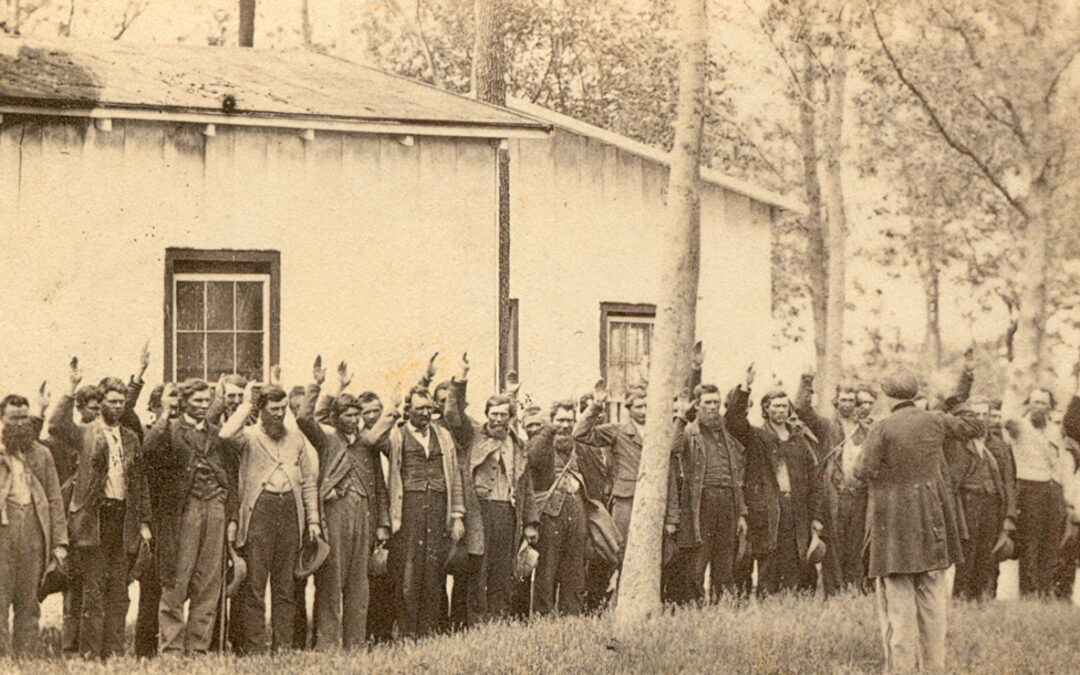
by Bret Capranica | Aug 29, 2013 | Biblical Studies, Eschatology, Expositions, Featured Articles, Pastoral Ministry, Preaching
How do you prepare yourself during the week to engage with God and participate in corporate worship on Sunday? Every week our church gives a number of ways to interact with the passage to be preached, and lists the songs that will be sung, in order to help our congregation be better prepared. These posts will also begin to populate THE CAPRANICA each Thursday. Carefully Think Read Daniel 1:1; 2:1; 5:1, 30, 31; 6:1; and 10:1. Where is Daniel? How many kings does he interact with? Read Daniel 1:1-20; 2:26-28; 6:1-10. Why is Daniel where he is and how would you characterize his character? Glance through the headings in your Bible of Daniel 1-6. Make a list of the sort of events recorded about his life. Glance through the headings in your bible for Daniel 7-12. What are these chapters primarily about? Read 12:5-13. What era of human history is being described in these events and when will they be completed? Read Daniel 2:20-23; 4:2-3, 34-35; 6:25-27; 7:9-10, 13-14. What is emphasized about God in these chapters? Prayerfully Meditate What do you learn about Daniel, his friends and what commitment to God looks like in the midst of opposition? Have you every experienced opposition from those outside of Christianity to your faith? When? How? How would Daniel be a helpful example to you? How could Daniel’s overt, God-centered life-style instruct you and how you conduct yourself at work, in your neighborhood, or in our culture generally? Read Daniel 9:1-19. How could this be a helpful prayer to model your own (or congregational) confession of sin? What is the primary...

by Bret Capranica | Dec 1, 2012 | Pastoral Ministry, Prayer, Preaching
Carefully Think Read Matthew 6:9-15. Recall last week’s message; what are we praying for when we ask for God’s name to be hallowed? What does it mean to “hallow” God’s name? Who is being asked to “hallow” God’s name? What is God’s kingdom and when is it “coming?” How is God’s will done in heaven? What are we praying when we ask for it to be done on earth? Prayerfully Meditate In light of Sunday’s opening message on prayer, how have you sought to incorporate it into your own prayer life? When you come to church this Sunday, think carefully about each movement of our time together. What is being emphasized in each part? How coudl this help you as you pray throughout the service? If God is sovereign, why do we pray for His will to be done? Which phrase within this prayer needs more focused attention in your own prayer time? Intentionally Act How will you specifically incorporate the first three phrases of the prayer in Matthew 6:9-10 into your regular time of prayer? Who will you pray for in this way? About what issues will you incorporate these themes as you pray? On at least three occasions this week, open your Bible to this passage and use it as a guide for your time of prayer. How does it help? What is most challenging in doing it? Use this model prayer in 6:9-13 in praying for our worship service this Sunday. Pray for those who do not know Christ and will be present in our service – that their hearts will be opened to God’s greateness,...

by Bret Capranica | Oct 13, 2012 | Featured Articles, Pastoral Ministry, Preaching
Carefully Think Read Matthew 5:38-42. Summarize in one sentence what the main idea is. How does Matthew 5:38-42 fit with the idea Jesus expressed in 5:17-20? Read Exodus 21:24; Leviticus 24:20; and Deuteronomy 19:21. What are these passages teaching about retaliation? Why would the OT emphasize this? How do these OT passages help you understand what Jesus is referring to in 5:38? Is Jesus contradicting the OT passages in 5:39? Why or why not? List the illustrations Jesus gives about retaliation in 5:39-42. What is the emphasis of each one uniquely (i.e., what is the issue with being slapped verses being sued, etc.)? Is Jesus advocating pacifism in these verses? Are Christians not to defend themselves? Is Jesus suggesting that we not advocate justice? Why – why not? Prayerfully Meditate How are Christians supposed to apply these concepts in 5:38-42 in day-to-day living? Over what sort of issues are you most prone to seek personal vengeance? How could you cultivate the default attitude of trusting God and not seeking revenge when taken advantage of? What sort of patterns of thinking would you need to develop? How could this affect how you pray for those who are unjustly taking advantage of you? What would help motivate a person to respond the way Jesus is advocating? How does the message of the gospel help cultivate this sort of response? Think back to what Jesus suffered. How did he respond? Why did he respond as he did? How would his responses be helpful in our cultivating a similar response? Intentionally Act Have you been expressing any personal animosity or vengeful attitudes toward...

by Bret Capranica | Oct 6, 2012 | Christian Living, Featured Articles, Pastoral Ministry, Preaching
Carefully Think Read Matthew 5:33-37. Summarize in one sentence what Jesus’ main point is. How does this passage relate to what Jesus said in 5:17-20? What are the similarities and differences between this passage and the previous sections (anger: 5:21-26; lust: 5:27-30; divorce: 5:31-32)? Read through the following OT passages: Exodus 20:7; Leviticus 19:12; Numbers 30:2; Deuteronomy 23:21-23. What background to the give to what Jesus says in Matthew 5:33-37? In what ways does Jesus define “do not take an oath at all” in 5:34-36? What does this suggest about the nature of an oath or what is involved in the kind of oath Jesus is referring to? Why does Jesus indicate that one should not take an oath and call heaven, hearth, Jerusalem, or your own head to account for the oath? What is Jesus’ point in bringing up these examples? Instead of taking an oath, what is the primary focus of a righteous person? Prayerfully Meditate Why does Jesus attack giving oaths? Does this include taking an oath in a court room or for those who serve political office? Why or why not? In the course of daily living, why would an oath be necessary? What are the greatest challenges to honesty? When are you most tempted to lie? Why are we often tempted to hedge the truth in what we say we will do? What would it take for you to be able to live in such a way that your “yes” or “no,” is believably sufficient? Intentionally Act As you think about the way you approach your own personal commitments, what needs to change in...

by Bret Capranica | Sep 27, 2012 | Featured Articles, Marriage and Family, Pastoral Ministry, Preaching
Carefully Think Read Matthew 5:31-32 Where did this instruction originally come from in the Old Testament? What is the connection between 5:31-32 to 5:27-30? What is the connection between 5:31-32 and 5:17-20? Is Jesus contradicting what was said in the OT by his statement in 5:32? Why or why not? Who are the various parties that Jesus indicates are guilty of sin in 5:32? Why would divorce and remarriage except on the grounds of immorality cause someone to commit adultery? Prayerfully Meditate Divorce is a prevalent and painful subject in our society. What are some of the modern day challenges with what Jesus says about divorce in 5:31-32? Why are they so challenging? What is Jesus saying about marriage in these verses? Why would immorality be legitimate grounds for divorce? Read 1 Corinthians 7:10-24. What grounds for divorce does Paul give? Read Matthew 19:1-9. What are the similarities and differences to 5:31-32? In light of the above passages and considerations, what elements would make for a stronger marriage? If you or someone you know has pursued divorce for unbiblical reasons, how could you helpfully serve them? How could you help a person who has legitimate grounds for divorce think through their heart attitudes and approach to the situation? Intentionally Act Has God put anyone on your heart in thinking through these issues? Pray for them to have a heart for God and a desire to obey His word. Plan a time to talk with them about what God’s word says on the issue. Do you and your spouse need to talk through what would make for a stronger marriage...

by Bret Capranica | Sep 25, 2012 | Featured Articles, Pastoral Ministry, Prayer, Preaching
Praying for the pastor who will preach each Sunday is something many Christians eagerly do each week. We realize that the task of teaching Scripture is a difficult one. Ensuring Scriptural accuracy, adequately serving a wide variety of people ethnically, in gender, generationally, socially, etc., all in one gathering is a daunting task. Doing it every week of the year, sometimes multiple times a week, makes the task even more challenging. Not only are the physical elements of preaching daunting, the spiritual challenges are even more pressing. To think in the terms Paul used, when we preach, we are either an aroma of life producing life, or death producing death: eternity is at stake each time we preach (2 Corinthians 2:14-17; 1 Timothy 4:15, 16). Above all the external challenges, the effectiveness of preaching is ultimately a work God must do in our hearts. That’s what makes praying for the preacher and the work of preaching so essential. And again, many Christians are so faithful to pray for their pastors each week as they preach. Preparation Prayer Teams For a number of years I have been honored, encouraged by, and helped by a group of people who have committed themselves to pray for me each week in respect to my preaching. But this group of people have not merely prayed in general for me and my preaching on Sunday, they have taken it a step further and have been to committed to pray for me long before Sunday. I’ve been blessed to have a team of people who commit to pray for me on the days and during the...













